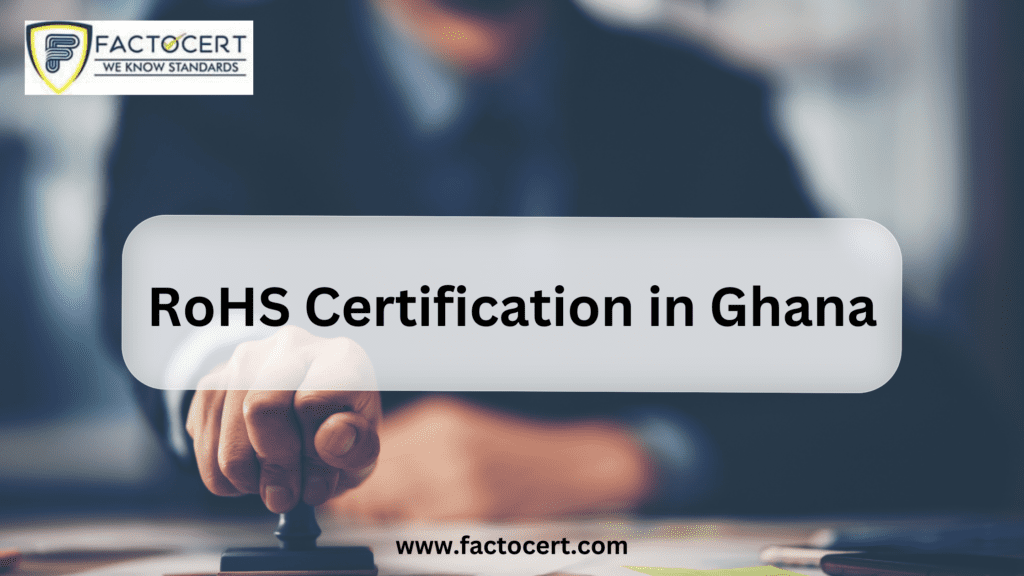RoHS Certification Making electronics is an important part of every country’s economic growth in today’s international market. As the need for tech goods grows, so does the need for manufacturing methods that are responsible and long-lasting. The Restriction of Hazardous Substances (RoHS) licence is an important part that has become more well-known in recent years. Manufacturers of electronics in Ghana need this approval more than anyone else because it makes sure they follow international standards and helps protect consumers and the environment.
Understanding RoHS Certification
RoHS Certification stands for “Restriction of Hazardous Substances,” which is the name of the rule that came from the European Union (EU). The main purpose of RoHS is to limit the use of dangerous materials in the production of electronics and electrical goods. Lead, mercury, cadmium, hexavalent chromium, polybrominated biphenyls (PBBs), and polybrominated diphenyl ethers (PBDEs) are some of the chemicals that RoHS doesn’t allow. It is known that these substances are bad for both people and the earth.
Impact on the World and Access to Markets
RoHS Certification is no longer just a European requirement; it has become a standard for making gadgets all over the world. Many countries, including Ghana, know how important it is to follow RoHS rules to make sure that electronic items are safe and of good quality. By getting RoHS Certification, manufacturers can sell their products in more countries around the world since many of those countries require electrical goods to meet these standards before they can be imported or sold.
This Certification gives Ghanaian companies that make electronics new chances and lets them fight on a global level. By following the RoHS rules, these companies show that they care about making safe and eco-friendly products, which boosts their image and ability to sell.
Protecting the environment with RoHS Compliance
One main goal of RoHS Certification is to make sure that electronic waste doesn’t hurt the earth too much. Electronics often have dangerous chemicals in them that can get into the land and water if they are not thrown away properly. This cannot be good for ecosystems and people’s health. RoHS wants to lower the damage that electronics do to the environment by limiting the use of things like lead and mercury.
Ghana is known for its dedication to long-term growth, and RoHS approval fits in with its environmental goals. RoHS requires electronics makers in Ghana to use eco-friendly production methods. This will help the country reduce electronic waste and promote a circular economy.
Keep people safe and healthy.
RoHS Certification is important for more than just the environment; it’s also important for public health and customer safety. The chemicals that aren’t allowed under RoHS are known to be dangerous, and being around them can cause serious health problems. For example, lead is a neurotoxin that can make kids’ behaviour and growth worse, especially when they are young. Adhering to RoHS standards shows that electronics companies in Ghana care about their customer’s safety and want to make sure their goods are reliable.
When people in Ghana buy electronics that are RoHS-certified, they know that the items meet strict safety standards. Not only does this protect people’s health, but it also helps build trust in the domestic electronics business.
Legal Compliance and the Reputation of the Industry
International trade is always changing, so it’s important to follow the rules set by regulators. RoHS Certification isn’t just a suggestion; in many cases, it’s the law that you need to get into certain areas. If you don’t follow the RoHS rules, you could face serious effects, such as having your products’ sales limited or being fined money.
Also, keeping a good image in your field is essential for long-term success. Electronics companies in Ghana that pay for RoHS approval show that they care about honestly doing business. International groups that care about sustainability and responsibly doing business may want to partner, collaborate, or engage because of this commitment.
Problems and chances for Ghanaian manufacturers
Electronics makers have to update their methods and materials in order to get RoHS Certification, which can be hard. But it also creates chances for growth and new ideas. Adopting RoHS standards might cost money at first, but the long-term benefits in terms of customer trust, market access, and protecting the environment are greater than the costs.
By using eco-friendly methods in their business, Ghanaian producers can use the Certification process to make themselves more competitive. This could lead to the creation of new technologies and methods that not only meet RoHS standards but also make Ghana a star in making electronics in a way that stays green.
Why Choose Factocert RoHS Certification in Ghana?
Are you seeking RoHS Certification in Ghana? Factocert is a significant RoHS Certification Bodies in Ghana, providing RoHS Consultants in Ghana and with offices in Accra, Kumasi, Tema, Tamale, Cape Coast, and other important cities. We provide a variety of ISO Standards at discounted prices, including ISO 27001, ISO 9001, RoHS, RoHS,GMP, SA 8000 Halal, ISO 17025, ISO 14001, ISO 22000, and others. For further information, please visit www.factocert.com or contact us at contact@factocert.com
Conclusion
RoHS Certification is very important for Ghanaian electronics manufacturers because it helps them reach global markets and protects the environment. It also makes sure that consumers are safe and that they follow the law. It also helps the industry’s image. As the electronics industry grows around the world, following RoHS standards is not just a choice; it’s also a must for good business practices and long-term growth. By getting RoHS approval, Ghanaian electronics makers can not only meet international standards but also help the country grow as a centre for making electronics that are both environmentally friendly and new.
For More information visit : RoHS Certification in Ghana





